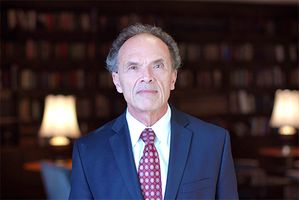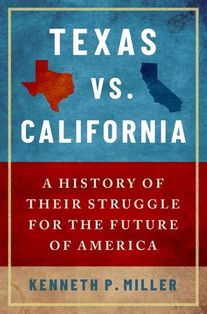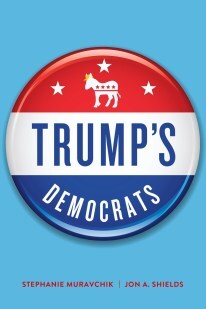Three different books by CMC professors showcase their expertise, while offering three distinct ways of looking at the upcoming presidential election in November.
Jack Pitney serves up a provocative point-of-view; while Jon Shields and co-author Stephanie Muravchik share what they learned traveling to working-class communities in three states, and Ken Miller analyzes national politics by examining the rivalry between “Red-Republican Texas” and “Blue-Democratic California.”

Ken Miller’s new book examines two-state rivalry
Prof. Ken Miller views his new book, Texas vs. California: A History of Their Struggle for the Future of America, as a biography of two rivals, states which are similar in size and origin, yet widely divergent when it comes to their current political identities.
In Miller’s perspective, an in-depth comparison of “Red-Republican Texas” with “Blue -Democratic California,” sheds light on the nation’s increasing polarization, which Miller calls “one of the defining political developments of our day.”
Miller, who is Rose Associate Professor of State and Local Government, teaches American politics, including a class devoted exclusively to California politics.
“It intrigues me that state politics are under rated,” said Miller a fifth-generation Californian, who once worked in the state capitol as a Senate Fellow. “Everyone focuses on Washington, D.C., but a lot of important policy is determined at the state level. It’s especially true in California, which is such a powerful state, economically and politically. Other states follow California’s lead, for example in environmental policy.”
To further understand what was happening in California, Miller began seeking a state to compare it to, specifically a state with a competing vision to California’s. “The second most populous and economically powerful state is Texas,” he said. “And it’s the mirror opposite of California, which makes it a natural, fascinating comparison.”
Read more
Jack Pitney’s latest book targets the president’s public posturing
“As far as I can tell, my family has been Republican since the Civil War on both sides,” said Jack Pitney, Roy P. Crocker Professor of American Politics.
And like his forebears—dairy farmers, shopkeepers, small-town political functionaries—Pitney was a GOP enthusiast from a tender age. By 13, he was leafletting for presidential candidate Richard Nixon in his hometown of Saratoga Springs, New York. On the morning of his 18th birthday, Pitney made a special trip to the county seat in Ballston Spa to register as a Republican. That was in 1973, the height of the Watergate scandal.
With Nixon’s resignation and Gerald Ford’s pardon, Pitney soldiered through GOP disgrace. He went on to work as a full-time staffer for Republican officials and organizations in Albany, New York City, and Washington, D.C. But for Pitney, the rise of Donald J. Trump as his party’s leader broke 40 years of good faith.
“I voted for every Republican presidential nominee between 1976 and 2012,” Pitney wrote in the preface to his new book, Un-American: The Fake Patriotism of Donald J. Trump. “When Donald Trump clinched the nomination in 2016, however, I knew that the streak would end.”
Read more
Historic 2016 election sent Jon Shields on a journey across America
In their new book, Trump’s Democrats, Jon Shields and co-author Stephanie Muravchik explore what compelled voters in consistently blue states to cast ballots for Republican presidential candidate Donald Trump in 2016.
“The 2016 election was the most surprising political event in my lifetime,” said Shields, an associate professor of government at CMC. “Writing this book was really just borne of deep curiosity, and a sense that something big and historic had happened, something that will reshape the future of our politics.”
To find out why blue voters flipped red, Shields and Muravchik—who are married with three sons—spent months living in Johnston, a Rhode Island suburb; Kentucky’s rural Elliott County; and Ottumwa, Iowa, the site of a meat-packing plant. Muravchik also joined CMC as a part-time visiting professor this fall.
Shields said they focused on these distinct areas because “all three places have longstanding and deep loyalties to the Democratic party. Not only did they vote for Barack Obama, since the New Deal they had voted—almost without fail—for Democrats. After the election, we were just itching to get into some of these communities.”
Read more



